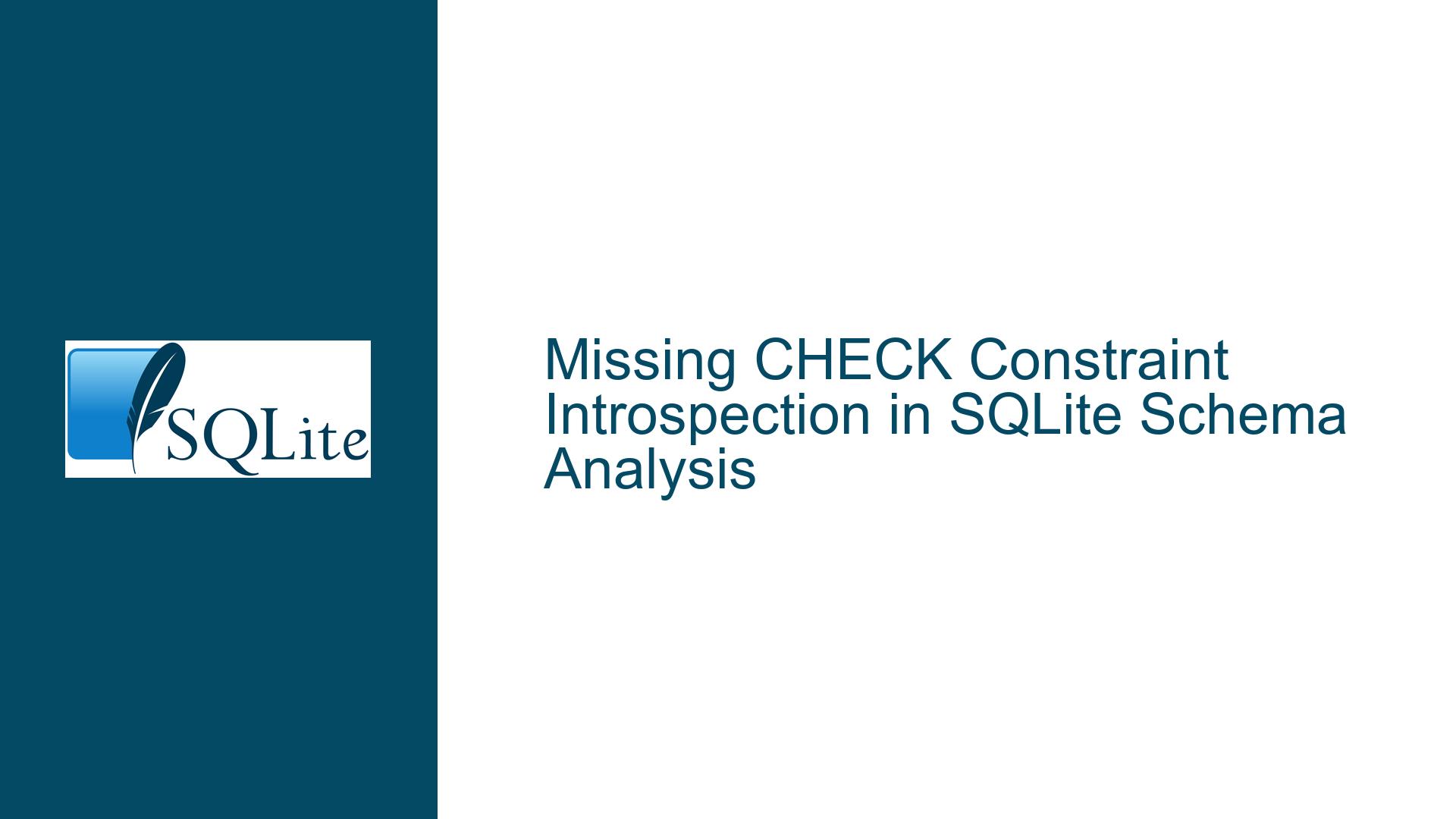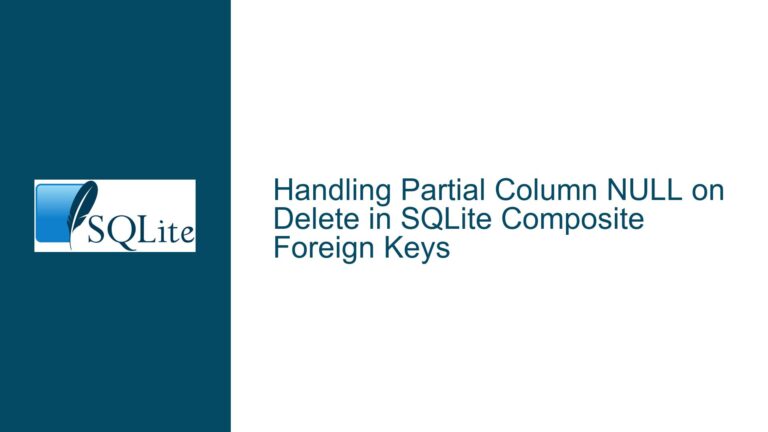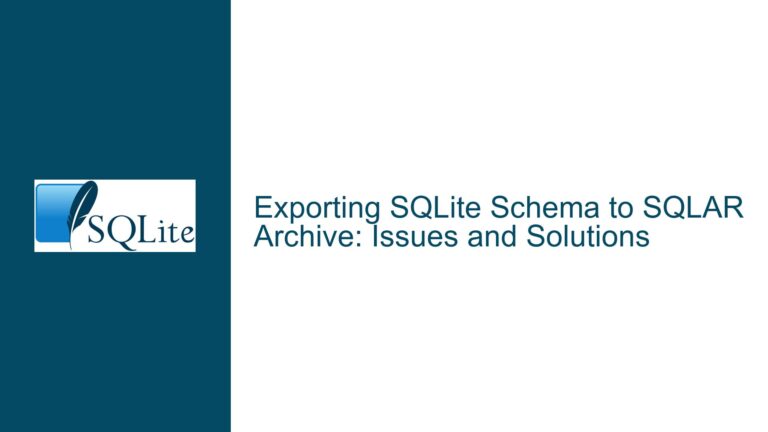Missing CHECK Constraint Introspection in SQLite Schema Analysis
Schema Introspection Limitations for CHECK Constraints in SQLite
The absence of native introspection capabilities for CHECK constraints creates a critical gap in SQLite’s metadata accessibility. While other database objects like tables, indexes, foreign keys, and column attributes are queryable via PRAGMA statements or the sqlite_master system table, CHECK constraints remain embedded within raw SQL schema definitions without programmatic access to their parsed components. This forces developers to implement custom SQL parsers or heuristic-based extraction methods when reconstructing schema metadata – particularly problematic for cross-database migration tools that require precise constraint definitions.
CHECK constraints differ from other constraint types in their structural complexity: They can reference multiple columns, include subqueries (in some RDBMS implementations), and employ SQLite-specific functions or operators. Unlike NOT NULL constraints (exposed in PRAGMA table_info) or foreign keys (via PRAGMA foreign_key_list), CHECK constraints are stored as unprocessed text blobs within sqlite_master.sql. This forces downstream systems to either (a) reimplement a partial SQL parser capable of handling SQLite’s dialect or (b) hardcode assumptions about constraint formatting that break when schema definitions evolve.
The operational impact manifests most severely in environments where SQLite serves as the primary schema definition source for heterogeneous database ecosystems. Consider a system generating PostgreSQL-compatible DDL from SQLite schemas: Without reliable CHECK constraint extraction, migrated schemas may omit critical business rules or produce syntactically invalid constraints due to dialect differences. This gap introduces maintenance overhead when columns are renamed, data types change, or constraint logic evolves – all scenarios requiring accurate constraint-to-column mapping unavailable through current introspection methods.
Root Causes of CHECK Constraint Introspection Deficits
Three primary factors contribute to SQLite’s lack of native CHECK constraint introspection. First is the historical development focus on embedded use cases rather than cross-database interoperability. SQLite’s PRAGMA commands were designed primarily for internal configuration and basic schema inspection, not full schema reconstruction. CHECK constraints – often containing complex expressions – didn’t fit neatly into the early PRAGMA data models that focused on tabular metadata (e.g., column names, foreign key relationships).
Second, the syntactic variability of CHECK constraints complicates standardized metadata exposure. A CHECK constraint may be defined at the column level (CREATE TABLE t (a INT CHECK(a > 0))) or table level (CREATE TABLE t (a INT, CHECK(a % 2 = 0))), may reference multiple columns, and can incorporate SQL functions, arithmetic operators, and nested expressions. Representing these structures in a generic format suitable for PRAGMA output would require defining a complex intermediate representation – a non-trivial engineering task given SQLite’s emphasis on minimalism.
Third, the existing workaround – parsing sqlite_master.sql – creates a false perception that native introspection is unnecessary. Since the raw SQL schema definitions contain CHECK constraints, developers are expected to parse them manually. However, this approach fails to account for schema normalization challenges: White space variations, comment stripping, and keyword case inconsistencies make reliable parsing difficult without a full SQL tokenizer. Moreover, generated columns use similar syntax (GENERATED ALWAYS AS (...)), increasing the risk of misidentification during heuristic parsing.
Strategies for CHECK Constraint Extraction and Metadata Reconstruction
While awaiting potential future SQLite enhancements, implement these strategies to reliably extract CHECK constraints:
Schema Parsing via SQL Tokenization Libraries
Leverage mature SQL parsers capable of handling SQLite’s dialect to analyze sqlite_master.sql entries. The sqlglot Python package provides bidirectional SQL translation and abstract syntax tree (AST) generation. By parsing the schema SQL into an AST, you can programmatically identify CHECK constraints and their associated columns:
import sqlglot
from sqlglot import parse_one, exp
schema_sql = "CREATE TABLE orders (id INT, amount DECIMAL CHECK (amount >= 0), CHECK (id IS NOT NULL AND amount IS NOT NULL))"
for statement in parse_one(schema_sql).find_all(exp.CreateTable):
for column in statement.args["columns"]:
for constraint in column.constraints:
if isinstance(constraint, exp.Check):
print(f"Column {column.name} has CHECK: {constraint.sql()}")
for table_constraint in statement.args["constraints"]:
if isinstance(table_constraint, exp.Check):
print(f"Table-level CHECK: {table_constraint.sql()}")
This approach handles formatting variations and extracts exact constraint expressions. Combine it with periodic SQLite version checks to adapt to syntax changes.
Hybrid Parsing with PRAGMA Data
Augment PRAGMA table_info output by cross-referencing column names with parsed CHECK constraints. SQLite’s PRAGMA table_info(table_name) returns a pk flag for primary keys but lacks CHECK metadata. By merging this data with parsed constraints from sqlite_master, you can map CHECKs to their respective columns:
- Query
PRAGMA table_info('orders')to get column names and positions. - Extract column-level CHECK constraints via SQL parsing.
- Merge the datasets using column positions/names to associate constraints.
This method works for column-level constraints but requires distinguishing them from table-level CHECKs during parsing.
Custom SQLite Extensions for CHECK Metadata
Develop a loadable SQLite extension that exposes CHECK constraints via virtual tables or custom PRAGMAs. Use SQLite’s sqlite3_create_module() API to create a check_constraints virtual table that queries sqlite_master, parses the SQL, and returns normalized constraint data. While this requires C programming, it provides the most seamless integration:
#include <sqlite3ext.h>
SQLITE_EXTENSION_INIT1
static int xBestIndex(sqlite3_vtab *tab, sqlite3_index_info *pIdxInfo) { /* ... */ }
static int xOpen(sqlite3_vtab *pVTab, sqlite3_vtab_cursor **ppCursor) { /* ... */ }
static int xNext(sqlite3_vtab_cursor *pCursor) {
// Parse sqlite_master entries here
}
// Register module in extension init
int sqlite3_checkconstraint_init(sqlite3 *db, char **pzErrMsg, const sqlite3_api_routines *pApi) {
SQLITE_EXTENSION_INIT2(pApi);
return sqlite3_create_module(db, "check_constraints", &checkConstraintsModule, 0);
}
Compile as a loadable extension (check_constraint.so/check_constraint.dylib) and query via:
SELECT * FROM check_constraints WHERE table_name = 'orders';
Trigger-Based Constraint Monitoring
For dynamic schema environments, create triggers that log CHECK constraint changes to a metadata table. This approach captures constraint additions/removals in real-time but requires wrapping schema modifications in migration procedures:
CREATE TABLE _check_metadata (
table_name TEXT,
constraint_sql TEXT,
created_at DATETIME DEFAULT CURRENT_TIMESTAMP
);
CREATE TRIGGER track_check_constraints AFTER CREATE ON DATABASE
WHEN sqlite3_event = 'table' AND sql LIKE '%CHECK%'
BEGIN
INSERT INTO _check_metadata (table_name, constraint_sql)
VALUES (sqlite3_event_table, sqlite3_event_sql);
END;
Cross-Compilation with Schema Diff Tools
Integrate schema comparison utilities like sqldiff or apgdiff to detect CHECK constraint changes during migrations. These tools parse SQLite schemas and generate difference scripts, which can be analyzed for CHECK constraint modifications. Pipe their output to extract constraint changes:
sqldiff source.db target.db | grep -E 'CHECK\s*\('
Proactive SQLite Schema Conventions
Mitigate parsing complexity by enforcing CHECK constraint formatting standards:
- Always use
/* column:col_name */comments in table-level CHECKs - Prefix column-level CHECKs with the column name
- Avoid splitting CHECK expressions across multiple lines
Example:
CREATE TABLE inventory (
item_id INTEGER PRIMARY KEY,
quantity INTEGER NOT NULL CHECK (quantity >= 0) /* column:quantity */,
/* table: CHECK (item_id > 1000 AND quantity <> 999) */
);
These conventions enable simpler regex-based parsing while maintaining SQLite compatibility.
Leverage SQLite’s CLI Schema Formatting
The sqlite3 command-line interface’s .schema command normalizes schema SQL by stripping comments and standardizing whitespace. Programmatically invoke the CLI to get a cleaned schema:
sqlite3 target.db '.schema orders' > schema_clean.sql
Then parse schema_clean.sql with reduced concern about formatting variations.
Contribute to SQLite’s PRAGMA Functionality
For long-term solutions, propose a PRAGMA check_constraints implementation to the SQLite team. Draft a specification covering:
- Constraint expression storage (original vs. normalized)
- Column association for column-level CHECKs
- Handling of CHECKs in views and generated columns
Reference PostgreSQL’s pg_constraint and MySQL’s CHECK_CONSTRAINTS in INFORMATION_SCHEMA as prior art. Prepare a proof-of-concept patch using SQLite’s internal parse tree to demonstrate feasibility.
Fallback to Restricted CHECK Syntax
If all parsing attempts prove unreliable, restrict CHECK constraints to a subset of SQL that’s easily regex-parsable. Use a helper function to validate and normalize constraints:
import re
def extract_checks(sql):
checks = []
# Match CHECK followed by parentheses, handling nested pairs
pattern = r'CHECK\s*\(((?:[^()]|\([^()]*\))*)\)'
for match in re.finditer(pattern, sql, re.IGNORECASE):
check_expr = match.group(1)
# Remove column association comments
check_expr = re.sub(r'/\*.*?\*/', '', check_expr).strip()
checks.append(check_expr)
return checks
This crude extraction works for simple constraints but fails on nested parentheses or quoted strings containing ‘CHECK’.
Continuous Integration Validation
Implement CI/CD checks that verify CHECK constraint parsability after schema migrations. Use a test suite that:
- Generates test databases with diverse CHECK constraints
- Runs the extraction code
- Compares extracted constraints against expected values
Fail builds when constraints cannot be reliably parsed, forcing schema authors to use compatible CHECK formats.
Conclusion
Until SQLite introduces native CHECK constraint introspection, a hybrid approach combining SQL parsing libraries, schema conventions, and PRAGMA augmentation provides the most robust solution. Prioritize methods that leverage existing SQLite metadata (e.g., sqlite_master) while isolating parsing complexity behind versioned helper functions. For mission-critical systems requiring perfect CHECK fidelity, investing in a custom SQLite extension or contributing upstream patches offers long-term stability.






